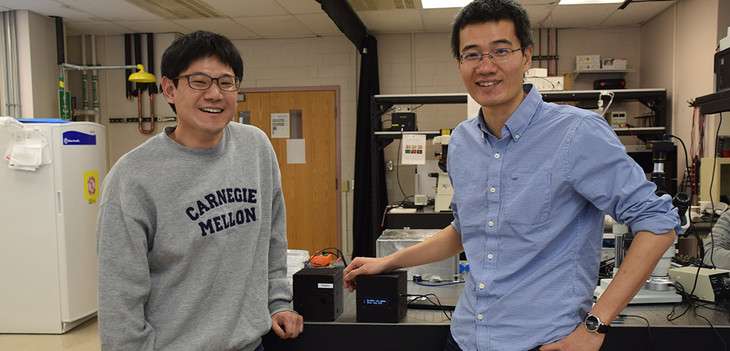Electrical engineers create device to diagnose patients more quickly

When a person contracts a disease, it takes time to diagnose the symptoms. Cell culturing, immunoassay and a nucleic-acid based diagnostic cycle all take several days, if not a week to determine the results. Not only do sick patients suffer during this time period, the wait can also lead to unnecessary disease spreading and perhaps avoidable antibiotic use.
Weihua Guan has created a device that will deliver a diagnosis to the patient in 30 minutes. The assistant professor of electrical engineering in the School of Electrical Engineering and Computer Science, with the help of his graduate student, Gihoon Choi, has created "AnyMDx: A Mobile Molecular Diagnostics Lab for Anyone, Anywhere, Anytime" for rapid diagnosis.
Their invention consists of three parts: a small footprint box which is the analyzer; a disposable disease-specific microfluidic compact disk that the doctor puts a patient's sample of blood, saliva, etc. in; and an optional smartphone app to interpret the results.
"By leveraging our advanced microfluidic, microelectronic and optic technologies, we are now able to integrate all the steps in nucleic acid diagnosis, including sample preparation, amplification and results reading, in a 'sample-in-answer-our' fashion," said Guan. "Our device can handle a wide variety of samples: whole blood, saliva, swab, sputum, urine, stool and various pathogen types: parasites, bacteria and viruses. Our device requires no expertise to run the advanced molecular diagnosis and it delivers the results to the patient in under 30 minutes."
Not only will AnyMDx be faster, Guan is working to make sure the device can be used in a harsh and resource-limiting environment. With help from funding from the College of Engineering's ENGineering for Innovation & Entrepreneurship (ENGINE) grant program, Guan and Choi are making sure the instrument is mobile, battery-powered and able to withstand any conditions, in any kind of environment. Collaborating with Liwang Cui in the College of Agricultural Sciences, their first objective is to get it deployed in the field by summer 2017 to Thailand and Myanmar to start diagnosing cases of malaria, where the disease is prevalent. Ultimately the goal is for hospitals, community clinics, doctors' offices and even pharmacies to have an AnyMDx readily available for diagnosis.
Provided by Pennsylvania State University





















